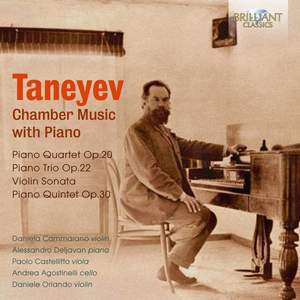A major set of Russian-Romantic chamber masterpieces in powerfully compelling new recordings.
Often known as ‘the Russian Brahms’, Sergei Taneyev has inspired devoted advocacy in musicians from Igor Oistrakh to Mikhail Pletnev and Steven Isserlis. Yet his music remains under-recorded and underappreciated, which is all the more curious in the case of his output for chamber music where he most nearly lives up to that unfair nickname. Aside from the late Violin Sonata, elliptical and no less Brahmsian in its way than its companions, all these works are conceived on a grand scale, abundant in soaring melody and impassioned lyricism, playing always to the strengths of their instrumentation and demanding the utmost in energy and commitment from their performers.
Composed first, the Piano Quartet is dark and densely textured like its companions, but it also makes the warmest and most loving embrace of the listener, from the piano’s opening outburst of passion onwards. In the right hands this is music it’s impossible not to love – and hard to forget, too, in the case of the Adagio’s yearning main theme. The Piano Trio emulates not only Taneyev’s friend Tchaikovsky but older German models, Beethoven in particular, with its independence of parts where the piano stands as first among equals. By turns impetuous and imperial, the Trio gives the lie to the old idea of Taneyev as presenting a sternly unyielding countenance.
Perhaps the most fully formed of this magnificent quartet is the Piano Quintet, where a Mendelssohnian lightness of touch in the Scherzo and finale counterbalances Taneyev at his most intense and contrapuntally driven in the huge opening Allegro.
Joined here by three experienced Italian colleagues, Daniela Cammarano and Alessandro Deljavan have previously won critical praise for their Brilliant Classics albums of chamber music by Johann Nepomuk Hummel (BC94898) and Anton Rubinstein (BC94605).
‘They drive [...] with plenty of energy; and Cammarano’s authority – and the quality of her violin – allow her to hold her own with the declamatory piano part. Strongly recommended for programme as well as for performances.’ – Fanfare, September 2014





